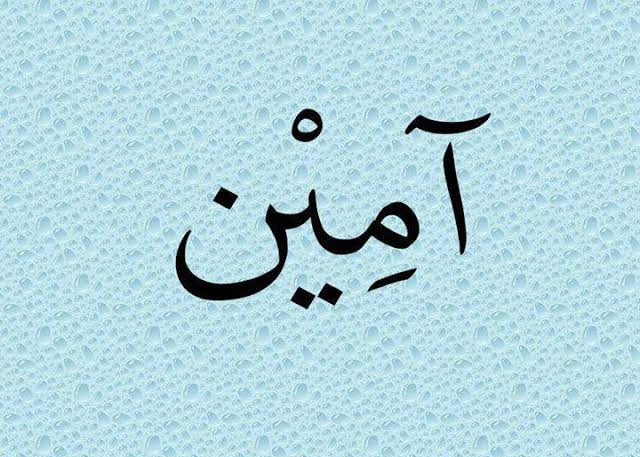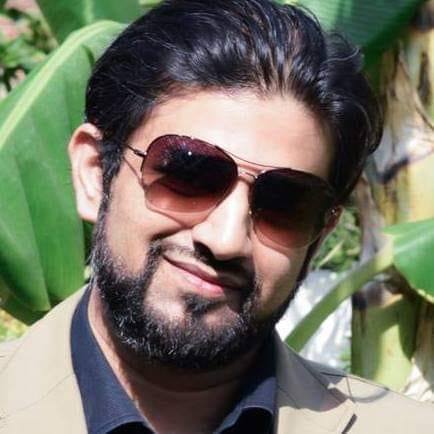
Saying Aameen silently or loudly in prayer?

Saying Aameen silently or loudly in prayer?
All four Sunni schools believe in saying Ameen in prayer whereas Shia school of thought consider it haram to say Ameen in prayer. Then there is further difference of opinion within Sunni schools whether to say it silently or loudly in prayer.
The Hanafi and Maliki schools of thought are of the opinion that Ameen should be said silently and they use many proofs in this regard. The primary proof they cite is from Qur’an which states:
Call on your Lord ”WITH HUMILITY AND IN PRIVATE” for Allah loveth not those who trespass beyond bounds. (Quran 7:55)
Ameen is a "DUA" hence It is proven from Qur’an to say Dua with humility and "IN PRIVATE (I.E. SILENCE)” therefore it should be said silently in prayer. This is a big proof from Qur’an
Among the hadiths which Hanafis and Malikis cite are:
حدثنا أبو داود قال حدثنا شعبة قال أخبرني سلمة ابن كهيل قال سمعت حجرا أبا العنبس قال سمعت علقمة ابن وائل يحدث عن وائل وقد سمعت من وائل انه صلى مع رسول الله صلى الله عليه وسلم فلما قرأ {غير المغضوب عليهم ولا الضالين} قال آمين خفض بها صوته
Translation: It is narrated by Wa’il bin Hujr (ra) that he prayed with the Prophet (Peace be upon him) and when the Prophet said: {Ghayr il Maghdoobi Alaihim Waladdaleen} he said “AMEEN SILENTLY”… [Musnad Abu Dawud al- Tiyalsi (1/576), Sunnan Tirimdhi (2/65), Musnad Ahmed bin Hanbal (5/412 #18863) and others]
All narrators of this hadith are “Thiqaat.” Imam Badr ud- din Ayni (rah) said of this hadith:
حديث صحيح الإسناد
Translation: This hadith has “SAHIH CHAIN" [Umdat ul Qari, Sharh Sahih ul Bukhari (6/47)]
Imam al- Hakim after narrating it said:
هذا حديث صحيح على شرط الشيخين ولم يخرجاه
Translation: This hadith is Sahih on the criteria of Bukhari and Muslim but they did not narrate it. [Mustadrak al Hakim (2/253, Hadith #2913). Al- Dhahabi agreed with Imam al- Hakim in his Talkhees]
حَدَّثَنَا يَعْقُوبُ بْنُ إِبْرَاهِيمَ، حَدَّثَنَا إِسْمَاعِيلُ، عَنْ يُونُسَ، عَنِ الْحَسَنِ، قَالَ قَالَ سَمُرَةُ حَفِظْتُ سَكْتَتَيْنِ فِي الصَّلاَةِ سَكْتَةً إِذَا كَبَّرَ الإِمَامُ حَتَّى يَقْرَأَ وَسَكْتَةً إِذَا فَرَغَ مِنْ فَاتِحَةِ الْكِتَابِ وَسُورَةٍ عِنْدَ الرُّكُوعِ قَالَ فَأَنْكَرَ ذَلِكَ عَلَيْهِ عِمْرَانُ بْنُ حُصَيْنٍ قَالَ فَكَتَبُوا فِي ذَلِكَ إِلَى الْمَدِينَةِ إِلَى أُبَىٍّ فَصَدَّقَ سَمُرَةَ
Translation: Narrated Samurah ibn Jundub: I remember two periods of silence in prayer, one when the imam said the takbir; and one when he finished reciting the Fatihah and the surah when he was about to bow. But Imran ibn Husayn took it as something strange. So they wrote about it to Ubayy (ibn Ka'b) in Medina. He verified the statement of Samurah. [Sunnan Abu Dawud Book 3, Hadith 776. Wrongly declared as weak by Albani but ironically it is declared “SAHIH” by Salafi Dar us Salam publication Vol.1, Page # 461, Hadith # 777]
This hadith decisively proves that one should remain silent until Imam starts recitation and also remain silent after Imam completes Surah al- Fatiha “ALONG WITH SURAH”
The first silence was observed in order to recite the thana silently, and the second to say the ameen silently.
It states in Sahih Bukhari: Narrated Abu Huraira: The Prophet (ﷺ) said, "Say Amin" when the Imam says it and if the Amin of any one of you coincides with that of the angels then all his past sins will be forgiven." Ibn Shihab said, "Allah's Messenger (ﷺ) used to Say "Amin."[Sahih Bukhari 1.747]
Although Imam Bukhari has made chapter title before this hadith about saying Ameen loudly by Imam but this hadith actually proves saying Ameen silently because “WE DO NOT HEAR THE ANGELS AND HENCE THEIR AMEEN IS SILENT”
عن أَبي وائل، قال: كان عمر وعلي رضي الله عنهما لا يجهران «بسم الله الرَّحمن الرَّحيم» ولا بالتعوّذ، ولا بالتأمين
Translation: Abu Wa'il narrates that 'Umar (RA) and 'Ali (A.S) "WOULD NOT" recite Bismillah, Audhobillah or Aameen aloud [Sharh Ma’ani al Athaar (1/204). Hafidh Nimawi al- Hanafi declared its chain as weak in Athaar al- Sunnan, Page # 144]
وروى أبو حمزة عن إبراهيم , عن علقمة , والأسود , عن عبد الله قال: « ثلاث يخفيهن الإمام: الاستعاذة, وبسم الله الرحمن الرحيم, وآمين» .
It is narrated by Ibn Masud (ra) that Imam should observe silence on three things (1) When reciting Audhobillah (2) Bismillah (3) And Aameen [Al- Insaaf by Imam Ibn Abdul Bar, Also Qadhi Shawkani in Nayl ul Awtaar (2/203)]
عبد الرزاق عن معمّر والثوري عن منصور عن إبراهيم أنه كان يسر آمين
Translation: It is narrated from Sufyan who heard from Mansur who narrates that “Ibrahim al- Nakha’i used to say AMEEN SILENTLY” [Musannaf Abdur Razzaq (2/87). Hafidh Nimawi al- Hanafi declared its chain as “Sahih” in Athaar al- Sunnan, Page # 145]
On the other hand the Shafis, Hanblis, and Salafis use these following proofs.
Wa'il bin Hujr narrated:"I heard the Prophet recite: (Not the way of those who earned Your anger, nor those who went astray) and he said: 'Amin.' And he stretched it out with his voice." [Jami’ at- Tirmidhi, Vol. 1, Book 2, Hadith 248. Declared authentic in Salafi Dar us Salam version]
Hanafis counter this hadith by saying that stretching the voice does not necessarily mean it was said loudly. Also Sufyan ath- Thawri (rah) is narrating with “AN” here and Salafis do not accept hadith when Sufyan narrates with “AN.” Shafis and Salafis then cite a hadith with different wording from Sunnan Abu Dawud which says “Raised his voice” [Sunnan Abu Dawud Book 3, Hadith 932] but that hadith is also narrated with “AN” of Sufyan so it should not be authentic according to Salafis. Plus due to inconsistency in wording the hadith shall be considered “Mudhtarib (inconsistent)” [Hafidh Nimawi al-Hanafi also called it “Mudhtarib” in Athaar al- Sunnan, Page # 142]
Shafis and Salafis then cite from chapter titles of Bukhari which states:
وَقَالَ عَطَاءٌ آمِينَ دُعَاءٌ أَمَّنَ ابْنُ الزُّبَيْرِ وَمَنْ وَرَاءَهُ حَتَّى إِنَّ لِلْمَسْجِدِ لَلَجَّةً
Ata (rah) said Ameen is a Dua, and Abdullah bin Zubair (ra) and those who were praying behind them said Ameen (so loudly) that the whole Mosque got echoed. [Sahih Bukhari]
This narration is narrated without chain in Bukhari but with chain in Musannaf Abdur Razaaq. It is weak due to Tadlees of Ibn Jurayj.
Shafis and Salafis also have another hadith which states:
Wail b, hujr said that he prayed behind the Messenger of Allah (ﷺ),and he said Amin loudly and saluted at his right and left sides until I saw the whiteness of his cheek. [Sunnan Abu Dawud, Book 2, Hadith 933. Declared Good and Authentic by al- Albani]
The Shia on the other hand consider Ameen in prayer rather even outside prayer to be Bidah and Haram. They have reports in this regard from their own books but I was not able to find a hadith in Sunni literature which says not to say Ameen in prayer.
Imam Sadiq said: Whenever you were in a Jama'at prayer and the Imam finished his Hamd then don't say Ameen, say “Alhamdolillahi Rabil Alameen” [at- Toosi in at- Tahdheeb (2/74)]
Shia also believe that saying Ameen in prayer invalidates the prayer. They go to the extent of saying that tradition of saying Ameen was inherited from Jews and Christians who also say “AMEN” after supplicating.
Reconciliation: The Hanafi and Maliki stance is strongest in this regard as Ameen is a dua and Qur’an establishes that Dua should be said in private. Also there are more hadiths on saying Ameen silently. The Shafis, Hanblis, and Salafis have their proofs too and they should be respected. The Shia are too strict in this regard and they should not declare prayer of majority of Muslims to be invalid for saying Ameen in prayer.


